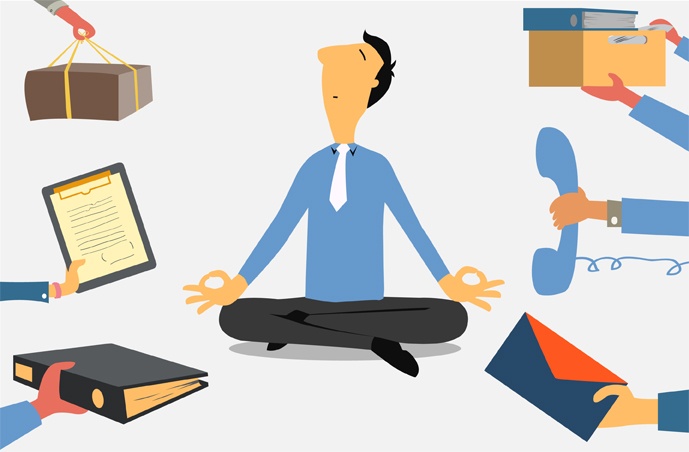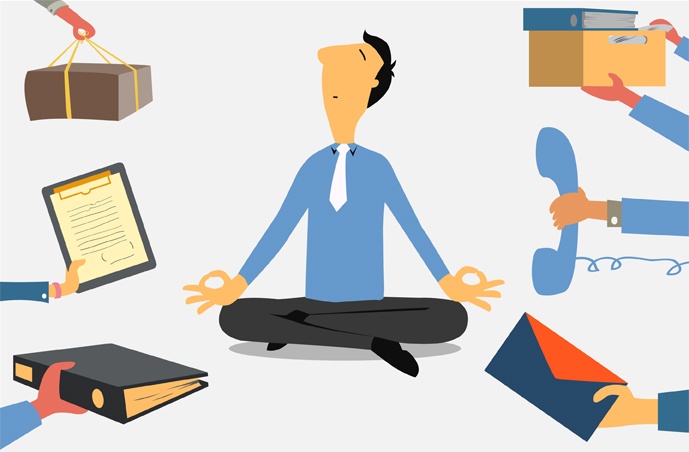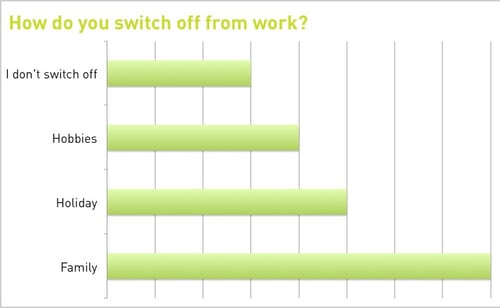Are You Due a Holiday? The Why and How to Switch Off From Work


How many times have you gone back home and could not stop thinking about work? No matter how hard we try, sometimes leaving our anxieties and issues at work seems like an impossible mission, and we keep "ruminating" on the day's events, discussions and problems. All of this, however, leads us to a state of continuous stress, which is really not good for our health.
Psychology Today states that chronic stress can lead to chronic problems, from hypertension and ulcers, to depression. If your stress hormones are high all the time, you can be prone to cognitive errors, such as mistakes and forgetfulness, but also to some more serious psychiatric and cardiovascular diseases. According to a study, men who are unable to mentally relax after work have threefold increased risk of heart disease. The Japanese even have a name for it: karōshi, which literally means "death from overwork".
During a recent survey we did among managers and directors of SMEs, we asked them: how do you switch off from work? What we found out is shown in the graph below.

A few people replied saying that they have never switched off in 30 years, but most of them revealed that they unwind by spending time with their family, going on holiday or following their hobbies.
Here are a few ideas to find your own way to switch off from work.
Get a hobby
Most of our survey respondents have stated that they have hobbies such as cycling, yoga, reading or playing golf. According to Peter Shellard, having hobbies focuses you to think laterally and to take more data in from around the periphery of what your actual problem is, and it's therefore a great way to switch off from work.
A study by Princeton's Alan Krueger found that we are at our happiest when we are involved in engaging leisure activities that allow us to build skills and meet a challenge, which can be anything from golf to rowing, as in this way we satisfy our core self-determination needs such as autonomy and competence.
Having a creative hobby is also incredibly helpful in stimulating your artistic side and creativity.
Change your emotional state
When you had a particularly stressful day, or had an argument with someone, Shallard explains that you should look for an emotional input that can change your mental state when you go home. It can be something along the lines of exercising, listening to good music or reading a good book, etc. In this way, the problem will vanish even if temporarily, giving you respite.
Yoga and meditation, such as the mindfulness technique, are also great for shifting the focus of attention.
Establish an unwinding ritual
Professor Mark Cropley, author of "The Off Switch", explains that establishing an unwinding ritual at the end of the day will train your mind to slow down. During the last half an hour of your day only begin jobs that are easy to complete, make a to-do list for the next day and clear your desk. In the long term, your mind and body will come to anticipate your winding down time.
Turn off your laptop and smartphone
It seems daunting, but as Mervyn Dinnen states on Metro, unless your job requires you to be on call 24/7, there is nothing that happens after 8pm that cannot wait until morning. Turning off all your devices will enable you to have an evening down time.
Go on holiday
The problem with holidays is that many people who cannot switch off tend to bring their work with them. We all agree that many of us don't have the luxury of being "unreachable" for a consecutive number of days, as there are always some problems or questions that people at the office urgently need to ask you in order to carry on with their jobs, but that doesn't mean that you have to spend your holiday working.
Before leaving, make sure that you delegate all of your tasks to everyone else in the office, and warn the right people of some potential issues that may arise, telling them what to do in that eventuality.
When you are actually on holiday, make sure you dedicate only a certain amount of time (e.g. between 1pm and 2pm) to checking your emails and phone and dealing with any issues that cannot wait, and make sure you stick to those times.
Plan your free time
We are all so good at planning our careers or how to grow our businesses, but what about planning our free time?
Planning in advance lets you have something to look forward to and enables you to make sure you make time to follow your hobbies.
Don't talk about work problems at home
You'd think that it's better to talk about your problems with someone from your family in the evening, but it might actually be very counter-productive. Debriefing during dinner is OK, especially if your work partner is also your significant other, but talking about work problems reactivates negative emotions associated with them. If you want to confide with your family or friends about something that happened at work, it's best to do a quick phone call during your lunch break, and leave work completely out of your evenings.
Conclusion
There are quite a lot of different ways in which you can switch off from work. They might not all work for you, as you may not be a sporty type or you can't afford to ever turn off your phone, so it's a matter of finding the one that is right for you.
How do you switch off from work? Are you also guilty of bringing work with you on holiday?
More from For fun

Another Google Tweak: how will longer snippets affect my website?
Like the terror-stricken Kevin McCallister here, you too could be forgiven for turning round and hiding under the bed covers...
White Paper Design: 7 Tips on How to Do It Right
Creating a strong whitepaper is a crucial part of inbound marketing (click here if you want to know more on what inbound...






